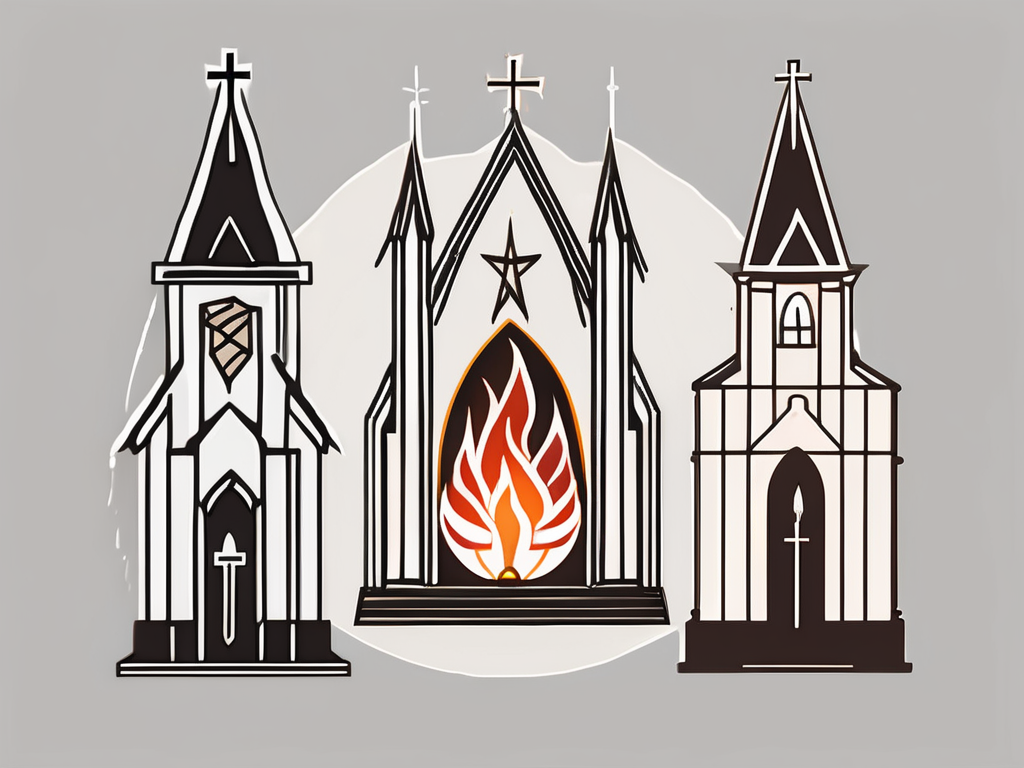In the world of Christianity, there is a vast array of denominations each with its own set of beliefs and practices. One such comparison worth exploring is that of Lutheranism and Pentecostalism. Both of these traditions have deep-rooted histories and millions of followers worldwide. By examining their core tenets and examining their religious practices, we can gain a better understanding of what sets them apart and what brings them together.
Understanding the Basic Tenets of Lutheranism
Lutheranism, as the name suggests, traces its origins back to the teachings of Martin Luther, a German theologian who lived during the 16th century. Luther’s ideas on grace, faith, and salvation sparked the Protestant Reformation, leading to the establishment of Lutheranism as a distinct Christian tradition.
The Lutheran Doctrine encompasses several key beliefs that shape the faith and practice of its adherents. Central to Lutheranism is the concept of justification by faith, the belief that one is saved through faith in Jesus Christ alone rather than by good works or human effort. Lutherans also emphasize the authority of Scripture and highlight the importance of the sacraments.
The Lutheran Doctrine: Key Beliefs
At the heart of Lutheranism lies a belief in the concepts of sola scriptura and sola fide. Sola scriptura asserts that the Bible is the ultimate authority in matters of faith and practice, surpassing the authority of any tradition or person. Sola fide, on the other hand, emphasizes that salvation is granted through faith alone, apart from any human works or merits.
These beliefs are not only theological concepts but also have practical implications for the lives of Lutherans. For example, the belief in sola scriptura means that Lutherans prioritize the study and interpretation of the Bible in their personal lives and in the worship services. They often engage in Bible study groups and encourage individuals to read and reflect on the Scriptures regularly.
Furthermore, the belief in sola fide influences the way Lutherans approach their relationship with God. They understand that their salvation is not dependent on their own efforts or achievements but solely on their faith in Jesus Christ. This understanding brings them a sense of freedom and assurance, as they trust in God’s grace and mercy.
The Role of Sacraments in Lutheranism
Sacraments hold a significant place within the Lutheran tradition. Lutherans recognize two sacraments, namely baptism and the Eucharist (also known as the Lord’s Supper or Holy Communion). Baptism is seen as a means of spiritual rebirth and initiation into the Christian community, while the Eucharist is viewed as a source of spiritual nourishment and a reminder of Christ’s sacrifice.
When it comes to baptism, Lutherans believe that it is not merely a symbolic act but a sacrament through which God’s grace is bestowed upon the individual. They understand baptism as a visible sign of God’s invisible work, where the water represents the cleansing and renewal of the Holy Spirit.
Similarly, the Eucharist is considered a sacrament of great importance in Lutheran worship. Lutherans believe in the real presence of Christ’s body and blood in the Eucharist, albeit in a mysterious and sacramental manner. This belief is known as the doctrine of consubstantiation, which stands in contrast to transubstantiation (the belief that the bread and wine physically become the body and blood of Christ).
During the Eucharistic celebration, Lutherans gather around the table to receive the bread and wine, which they believe to be the body and blood of Christ. This act of receiving the sacrament is seen as a way to commune with God and to be spiritually nourished.
The Lutheran Church Structure and Leadership
Lutheran churches are typically organized into synods, which are regional or national administrative bodies that oversee the affairs of their member congregations. Each synod is led by a bishop or president who provides leadership and guidance to the churches within their jurisdiction. Within individual congregations, pastors serve as spiritual leaders, conducting worship services, providing pastoral care, and teaching the Bible.
One notable aspect of Lutheran church governance is the involvement of congregational members in decision-making processes. Congregational meetings are held regularly, allowing members to have a voice in matters such as budgeting, the calling of new pastors, and other significant issues within the local church community.
This emphasis on congregational involvement reflects the Lutheran belief in the priesthood of all believers. Lutherans understand that all baptized Christians have a role to play in the life of the church and that each member’s voice is valued and important.
Furthermore, Lutherans also have a strong tradition of lay leadership. Laypeople are encouraged to take on various roles within the church, such as serving on committees, leading ministries, and participating in outreach activities. This active participation of laypeople helps to create a sense of community and shared responsibility within the Lutheran church.
Delving into Pentecostalism
Pentecostalism, a relatively newer movement within Christianity, emerged during the early 20th century and quickly spread across the globe. Pentecostalism places a strong emphasis on the work of the Holy Spirit, spiritual gifts, and personal religious experiences.
As Pentecostalism gained momentum, it became known for its vibrant worship services and passionate expressions of faith. Congregations would often gather in small, humble buildings or even in open fields, where believers would come together to experience the power of the Holy Spirit. These gatherings were marked by fervent prayer, exuberant singing, and spontaneous expressions of worship.
One of the fundamental beliefs of Pentecostals is the doctrine of the baptism of the Holy Spirit. Pentecostals believe in a distinct experience, often referred to as being “filled with the Spirit” or “spiritual baptism,” in which believers are empowered by the Holy Spirit for spiritual gifts and a deeper relationship with God. This experience is often accompanied by speaking in tongues, a practice that dates back to the early Christian church as described in the Book of Acts.
Pentecostalism also highlights the ongoing work of the Holy Spirit in the lives of believers, emphasizing the importance of spiritual gifts such as prophecy, healing, and speaking in tongues. These gifts are seen as crucial for the edification of the church and for the proclamation of the Gospel.
For Pentecostals, spiritual gifts are not merely abstract concepts but are seen as active manifestations of the Holy Spirit’s power and presence. These gifts are believed to be available to all believers, serving as a means to build up the church and bring glory to God. Pentecostal worship services often feature the use of spiritual gifts, including vibrant worship, spontaneous prayers, and the laying-on of hands for healing and spiritual empowerment.
While the practice of spiritual gifts can vary among different Pentecostal denominations and churches, the emphasis on the Holy Spirit’s active involvement in the lives of believers remains a common thread that unites Pentecostalism as a whole.
Pentecostal churches tend to have a more decentralized structure compared to some other Christian traditions. While there are overarching Pentecostal organizations and denominations, individual churches often have autonomy in their decision-making processes and leadership structures.
Leadership within Pentecostal churches is commonly multi-tiered, with pastors overseeing individual congregations, and higher levels of leadership beyond the local church, such as district superintendents or overseers. This flexibility in governance allows for a certain level of adaptability and responsiveness to local contexts and needs.
As Pentecostalism continues to grow, it has become a significant force within global Christianity. Today, Pentecostal churches can be found in nearly every country, with millions of adherents who are passionate about their faith and the transformative power of the Holy Spirit.
Comparing Lutheran and Pentecostal Beliefs
Despite the theological and philosophical differences between Lutheranism and Pentecostalism, there are areas of overlap and shared beliefs.
When exploring the similarities in core beliefs, it becomes evident that both Lutherans and Pentecostals affirm the central tenets of Christianity. They firmly believe in the Trinity, acknowledging the Father, Son, and Holy Spirit as three distinct persons in one God. Furthermore, both traditions uphold the divinity of Christ, recognizing Him as the Son of God who came to earth to save humanity from sin.
Another shared belief between Lutherans and Pentecostals is the authority of Scripture. Both traditions regard the Bible as the inspired and infallible Word of God, containing all necessary teachings for faith and practice. This common foundation provides a solid basis for theological discussions and interpretations within each tradition.
Additionally, Lutherans and Pentecostals both emphasize the importance of prayer in the life of a believer. They recognize prayer as a means of communication with God, seeking His guidance, comfort, and intervention. Both traditions encourage their members to develop a personal relationship with God through prayer, recognizing its transformative power in their lives.
Furthermore, both Lutherans and Pentecostals share a commitment to the Great Commission. This biblical mandate, given by Jesus Christ, calls believers to share the message of salvation and make disciples of all nations. The shared mission of spreading the Gospel underscores the importance of evangelism and reaching out to others with the hope of salvation.
Differences in Theological Perspectives
While Lutherans and Pentecostals share foundational beliefs, there are notable differences in their theological perspectives and practices.
For example, Lutherans place a significant emphasis on the sacraments, particularly baptism and the Eucharist. They view these sacraments as important means through which God’s grace is conveyed to believers. Lutherans believe that in baptism, individuals are united with Christ and receive the forgiveness of sins. Similarly, in the Eucharist, they believe that the body and blood of Christ are truly present, offering spiritual nourishment and strengthening the faith of the participants.
In contrast, Pentecostals focus on the active work of the Holy Spirit and the experience of spiritual gifts as key aspects of their faith. They believe in the ongoing work of the Holy Spirit in the lives of believers, empowering them for service and equipping them with spiritual gifts. Pentecostals place a strong emphasis on the baptism of the Holy Spirit, which they believe is a distinct experience subsequent to salvation and marked by the evidence of speaking in tongues.
Additionally, the worship styles of Lutheran and Pentecostal churches differ significantly. Lutherans often embrace a more structured and liturgical approach to worship. Their services follow a formal order of worship, incorporating elements such as hymns, prayers, Scripture readings, and a sermon. The liturgical nature of Lutheran worship aims to engage the congregation in a reverent and reflective atmosphere.
In contrast, Pentecostals tend to favor a more spontaneous and expressive style of worship. Their services are characterized by a sense of freedom and openness to the leading of the Holy Spirit. Pentecostals often engage in lively praise and worship, with an emphasis on music, singing, and dancing. They believe in the manifestation of spiritual gifts during worship, such as prophecy, healing, and speaking in tongues.
These theological differences contribute to the distinct practices and experiences found within Lutheran and Pentecostal communities. While both traditions share a common faith in Christ, their unique perspectives and worship styles offer diverse expressions of Christianity.
Contrasting Practices between Lutheranism and Pentecostalism
Beyond theological perspectives, there are several practical differences in the way Lutherans and Pentecostals worship and practice their faith.
Worship Styles: Lutheran vs. Pentecostal
Lutheran worship services often follow a structured liturgy, with specific orders of prayers, readings, and hymns. The Eucharist is typically celebrated regularly, often with a reverence for tradition and historical practices.
In contrast, Pentecostal worship services are often characterized by lively music, enthusiastic praise, and spontaneous expressions of worship. These services may also include extended times of prayer, personal testimonies, and the exercising of spiritual gifts.
Role of Women in Lutheranism and Pentecostalism
Regarding the role of women, Lutheranism and Pentecostalism differ as well. While both traditions affirm the equal value and worth of men and women, their views on women in leadership roles vary.
Lutheranism, particularly within its more conservative branches, tends to have more limitations on women’s participation in ordained ministry. However, in recent years, many Lutheran synods have embraced the ordination of women to the pastoral office.
Pentecostalism, in general, has been more open to women in leadership positions, with women serving as pastors, evangelists, and in other prominent roles within the church. This inclusivity of women in leadership is seen as a reflection of the belief in the Spirit’s empowerment available to all believers, regardless of gender.
Impact of Beliefs and Practices on Community Life
Understanding the beliefs and practices of Lutheranism and Pentecostalism goes beyond theological curiosity. These beliefs and practices have a tangible impact on the daily lives and community involvement of their adherents.
Community Involvement in Lutheran and Pentecostal Churches
Both Lutherans and Pentecostals value community and recognize the importance of caring for others. Lutherans often engage in various forms of community service, such as running food pantries, offering counseling services, and participating in ecumenical efforts to address social justice issues.
Pentecostal churches also actively engage in community outreach, often emphasizing the importance of personal relationships and meeting practical needs. This can include activities such as feeding the hungry, providing disaster relief, and running programs for at-risk youth.
Social and Cultural Implications of Beliefs and Practices
The beliefs and practices of Lutheranism and Pentecostalism can also have broader social and cultural implications. Lutherans, with their emphasis on education and theological reflection, have made significant contributions to the development of Western thought and education.
Pentecostalism, with its focus on personal experiences and spiritual gifts, has had a profound impact on the expression of Christian faith in various cultural contexts. Pentecostalism has been particularly influential in the realms of music, worship styles, and evangelism.
Ultimately, the beliefs and practices of Lutheranism and Pentecostalism shape not only the individual lives of their followers but also their engagement with the wider world.
In conclusion, Lutheranism and Pentecostalism represent two distinct branches within Christianity, each with its own unique beliefs and practices. Despite their differences, both traditions share central Christian beliefs and a commitment to spreading the Gospel. Understanding the nuances of these theological perspectives and exploring their impact on community life can foster a deeper appreciation for the diversity within the Christian faith.












